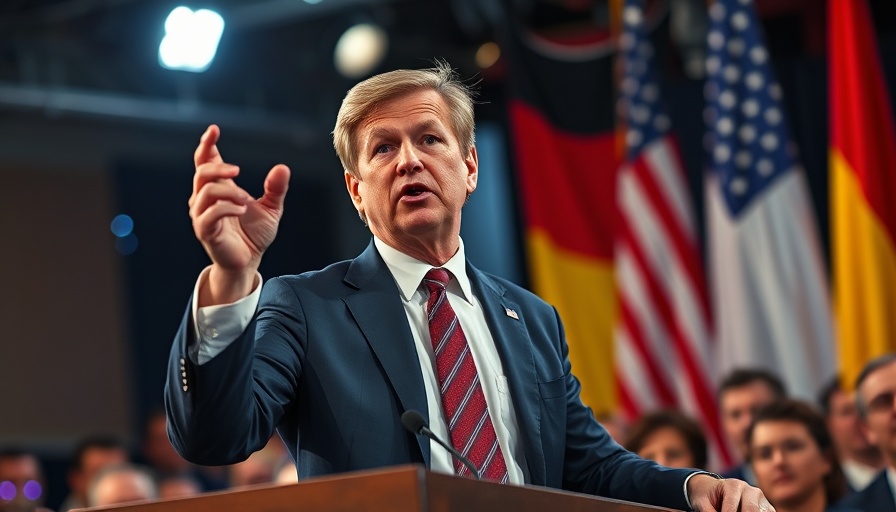
Merz's Election Victory: A New Direction for Germany
Friedrich Merz's unexpected rise to power after the recent German elections marks a significant turning point in Germany's foreign relations, particularly its historical ties with the United States. Following the coalition collapse of Chancellor Olaf Scholz’s administration, the election delivered a sweeping victory for Merz’s Christian Democratic Union (CDU), which secured 28.6% of the vote and positioned Merz to become Germany's new chancellor.
A Shift in Foreign Policy Perspectives
Unlike his predecessor, Merz's rhetoric signals a desire to reconfigure Germany’s alignment with transatlantic allies. Where previous leadership emphasized strong ties with the U.S., Merz’s comments reflect a growing consensus in parts of the political landscape for a more independent European stance. "After Donald Trump’s remarks... it is clear that this government does not care much about the fate of Europe," he shared, suggesting that the U.S.'s recent indifference has catalyzed a desire for a re-evaluated European autonomy.
Changing Dynamics in U.S.-European Relations
This election's results highlight a broader sentiment within Germany regarding its geopolitical posture. While traditional alliances have long been foundational, Merz’s statements about wanting to create "real independence" from the U.S. resonate with a growing frustration over American foreign policy. His direct criticisms of U.S. interventions and calls for European unity are echoes of profound shifts in how some German leaders envision their nation’s role on the world stage, akin to positions historically adopted by leaders like Charles de Gaulle.
The Rise of Alternative Political Views
The electoral success of the far-right Alternative for Germany (AfD), which garnered 20.8% of the vote, further complicates the political landscape. As they advocate for a departure from military engagements abroad, their influence poses significant questions about the unity of Europe in matters of defense and cooperation. Observers are now left to ponder the implications for a CDP-led coalition that will need to navigate these divisive perspectives while pursuing a coherent foreign policy agenda.
Implications for Economic and Trade Policies
Intriguingly, Merz's call for strengthening Europe is not just a matter of defense but also points to a pressing need for economic resilience. The ailing German economy demands an urgent response, with trade relations and security increasingly tied to a stable geopolitical environment. As the prospect of coalition talks loom, there is a risk that indecision could exacerbate economic challenges, impacting not just Germany but its trading partners across Europe.
The Coalition Challenge Ahead
The road ahead is fraught with challenges as Merz embarks on coalition negotiations with various factions, including the SPD and other smaller parties. The delicate balance of securing a majority while respecting the rise of the AfD will test his political acumen. Observers worry that the lengthy negotiations may paralyze policy-making at a critical juncture, leaving Germany in a precarious position not only politically but also economically.
What Lies Ahead for German and European Politics?
As Merz’s administration takes shape, the scrutiny will be on whether it can deliver a fresh approach that genuinely moves toward European independence while maintaining the intricate balance of transatlantic relations. The electoral shifts signify more than just party changes; they reflect deeper societal sentiments about identity, security, and the future of international trade.
In summary, Friedrich Merz's electoral victory heralds a potential pivot in German foreign policy that may have implications for Europe’s relationships on the global stage. For import-export companies, remaining attuned to these shifts will be crucial. Businesses should prepare for evolving economic policies that may foster new opportunities and challenges in trade dynamics within Europe.
 Add Row
Add Row  Add
Add 




 Add Row
Add Row  Add
Add 

Write A Comment